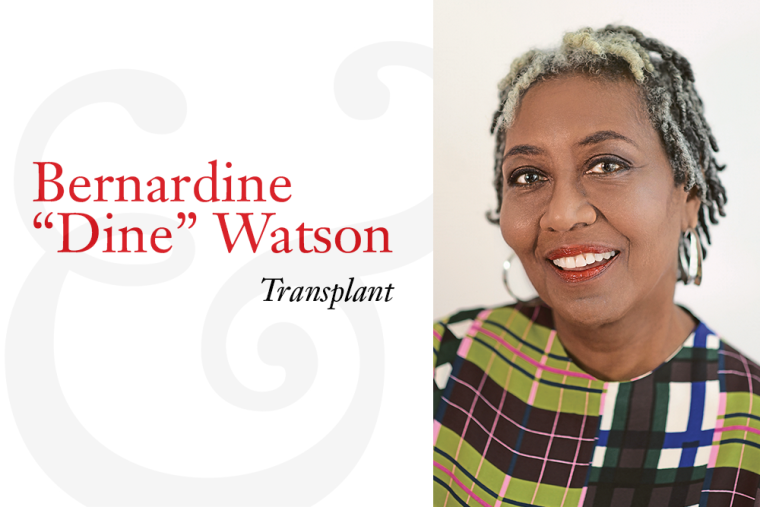Bernardine “Dine” Watson
Age: 72. Residence: Washington, D.C. Book: Transplant (Washington Writers’ Publishing House, October 2023), a memoir about becoming and overcoming, about one woman’s resilient journey in fighting kidney disease, braiding together the underbelly of the American health care system with a story of love and family. Agent: None. Editors: Caroline Bock and Kathleen Wheaton.

In 1963, when I was in sixth grade, I wrote my school’s Christmas play, which was performed in the auditorium to great applause from students, teachers, and parents. Everyone congratulated my family for having a “budding writer” on their hands.
My parents were proud of me, and I remember being quite proud of myself. I was, however, from a poor, Black community in South Philadelphia. Being a “good writer” meant little. There were no creative writing classes in my neighborhood to nurture my talent. While learning was important in my family, and my parents did their best to make sure their five children received good public-school educations, attending college, where I might pursue my writing, was hardly a given. After high school, I went to Community College of Philadelphia to study secretarial sciences so I could get a “good job.”
Later in 1971 fate intervened to hand me what seemed like a major setback; my son, Robert, was born before I was out of my teens. But one look into my baby’s face only made me determined to improve my life. Fortunately, the early 1970s came on the heels of LBJ’s Great Society, the largest expansion of social programs in the country since FDR’s New Deal. I took advantage of every possible program that was still in place and radically changed my trajectory. I left my secretarial studies, transferred to Temple University, and earned bachelor’s and master’s degrees in urban studies. With this additional education I launched a successful career in the social-policy field, which catapulted me into the middle class.
In the social-policy world, having good writing skills meant a lot. Over the years I wrote proposals, concept papers, and articles for foundations, think tanks, nonprofits, and newspapers. Still, I never considered myself a “real” writer, or experienced the pride I felt in sixth grade when I wrote the Christmas play. Back then I dreamed of being a published author of plays, books, and poems—whatever my heart desired. But when I became an adult, my writing meant a steady income so I could care for my son, and employer-sponsored health insurance when, as fate would have it, I developed a rare kidney disease. At that point I all but forgot about my dreams.
However, by 2013, at age 62, I was in an entirely different situation. My son was an adult. I was retired, recuperating from a second kidney transplant, and married to a loving, supportive man. Over dinner one evening, a new friend and I were exchanging stories about our lives. As I told her about my struggles with a kidney disease that primarily affects Black people, my five years on dialysis, and my kidney transplants, her eyes widened. “You should write a book about your experiences. You’re able to do that now.”
I often wonder if fate spoke through my friend that evening and once again changed my life’s direction. Ten years after the portentous conversation with my friend, and sixty years after my writing debut at twelve years old, my memoir, Transplant, is being published by Washington Writers’ Publishing House.
I’ve traveled a long, often tough road to achieve my dream, sometimes impeded by my own life circumstances, but also by the publishing industry. Numerous agents declined to represent me, saying that, while they liked Transplant, publishers wouldn’t be interested in my story because I wasn’t famous. I was about to put Transplant aside when I saw an announcement for WWPH’s inaugural creative nonfiction prize. A quiet but clear voice inside my head encouraged me to enter. After so many years of dreaming, what did I have to lose?
Now I tell writers of any age to, as Langston Hughes wrote, “hold fast to dreams,” especially those carried deep in their hearts from childhood. Who knows what fate has in store?
Author photo: Leigh H. Mosley. Book photo: David Hamsley.









